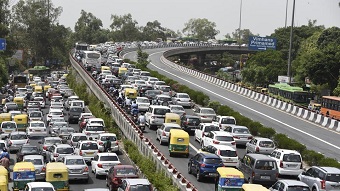A third of the city’s traffic managed by Artificial Intelligence (AI), fewer traffic policemen, and depth sensors that will regulate traffic signals — this isn’t a futuristic version of a first-world city, but a short-term plan for Delhi in, believe it or not, 2019.
Last month, Delhi’s top police officers shared the concept note for the Rs 1,000 crore project with Lieutenant Governor Anil Baijal and senior government officers. They received an approval to use AI to manage traffic and have hired a technical consultant to implement the project. In July, a police officer familiar with the matter said the police would place a tender for the sensor-based cameras which will feed data into the AI software.
Special Commissioner of Police (Traffic) Depender Pathak, who is also the city traffic police chief, confirmed that his department has started work on this futuristic project. “High resolution cameras with sensor based real time traffic volume count technology will first be placed on all arterial roads. Around 7,000-8,000 cameras with multidirectional infrared and colourless laser sensors will count the volume based on image pattern analysis. At every signal we will also have IP based public address system. Through the cameras, we will see the traffic and also communicate with the drivers while on move or at signals using the PA system.”
For the first few months, the 7,000 cameras will collect data (the use of AI has become possible because of two developments, so-called Big Data, which can be used by software to learn, a process made possible through what is called deep learning).
Apart from the cameras, the police department also plans to order LED boards. According to the project report, the 1000 LED boards will be synced with the AI software and the cameras, and display real time information about traffic so that drivers know which road to use or avoid.”
With most traffic officers off the roads — only a few will be around for emergencies — there will be smart traffic control rooms where traffic personnel will monitor the cameras. If the project goes as planned, the police may not even have to be on the roads to issue tickets. Top police officers said the Delhi police is in touch with different ministries to bring about policy changes in traffic and transport. A senior officer said that the police would write to the government to make it mandatory for all Delhi registered vehicles to have a device (or chip) on-board which can be recognized by the system. Tickets can then directly be sent to the owner with details from the data base of central government’s e-vahaan and e sarthi portals.








